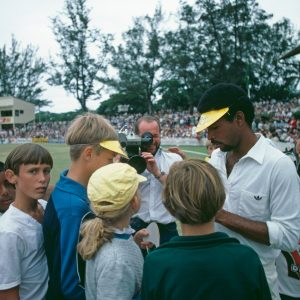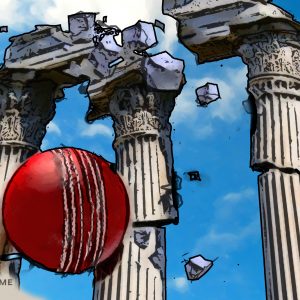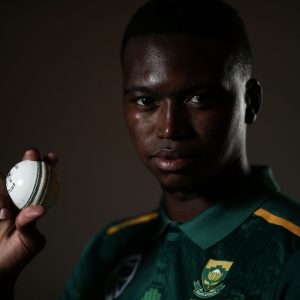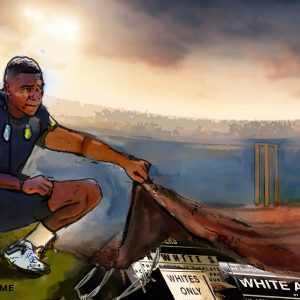Geoffrey Toyana’s long fight against prejudice
That the CSA president acknowledged Toyana should have coached SA was unsurprising. He has endured much more than that oversight, while continuing to produce Proteas.
Author:
17 August 2020

“You felt that you were on trial every single time you walked on to the field, one failure away from being on the bench. No one can perform freely under those conditions. No one.”
The trials of a young Geoffrey Toyana, an up-and-coming cricketer from Soweto in the 1990s, have become his guiding fundamentals as a coach in the senior South African cricket structures. He could just as easily have been a national coach a few years ago, with his Lions side playing a brand of cricket that justified the faith shown in the first black African head coach in the franchise system.
That “could have” was seemingly elevated to “should have” on Thursday 6 August, when outgoing Cricket South Africa president Chris Nenzani told radio talk show host Robert Marawa that the employment of former West Indian fast bowler Ottis Gibson as national coach instead of Toyana was “a missed opportunity”.
Toyana, still with a knowing nod and a smile that masks much of his pain, has seen and felt the rigours of the South African system his entire adult life. For his sins, he is an outspoken Mamelodi Sundowns and Liverpool football fan, so he knows only too well that life has plenty of ups and downs.
Related article:
“I know what the quota label feels like for a player, and it is something that has turned away some of the best talents we never saw in South African cricket,” Toyana, now the Northerns coach in the first-class circuit, says seriously.
“As a young player, one of the big things you need to have is the backing that allows you to fail from time to time. South Africa is a tough place to bat in any case, and more so when you are still making your way into the highest levels.”
Being a black cricketer in SA
He recalls the Jekyll and Hyde conversations with management, depending on match conditions. On a flat deck, with the sun shining, he was often asked to slip down the order and then come in to slog for a few quick runs before a mooted declaration. On livelier tracks, though, he would find himself suddenly elevated into the top three, supposedly given a gilt-edged opportunity to show his credentials.
Far from creating an environment that gave black players their best chance at success, there always seemed to be a trapdoor waiting for them to unwittingly fall through. And this trend has stuck around, with a rash of young black Proteas publicly selected then privately neglected when in their best form. Ask Khaya Zondo, whose late 2015 Indian experience was humiliating and mentally scarring.
“When we were coming through, transformation was something new. And back then there only had to be one black African in the playing 11. There would usually be two of us in the squad, so you would have a situation where the black players, bowler or batter, were vying for the same spot,” he recalls of his days playing in the old Supersport Series.
Related article:
“I still don’t know how you choose a team along those lines, because it seemed as if the plan was to get the quota out of the way and then worry about the actual team. As that one guy, you felt so isolated, and you wondered what the rest of the team thought about you even being there. You had to be very mentally tough.”
It is that early sense of “othering” that seeps into every aspect of the sport, he adds. Change has been as slow and painful as it has because the default has been to think of black cricketers in the system as token development players. Know your place. Don’t overstate your case. Remember your race.
This attitude has produced a generation of frustration and resentment. We have winced at frontline batsmen demoted to as low as number nine in the batting order. And promising bowlers used only after the supply of part-timers had been exhausted.
Toyana sighs when he still hears questions around the legitimacy of “black cricket”. It’s in his blood. He laments the “lost generation” after his father’s time, when Gus Toyana and the Majola brothers, along with the likes of Rodney Malamba, fiercely played the game in a manner that poured scorn on those who insisted it was never a black man’s sport.
“We will never know what heights they could have reached with better facilities, better opportunities. But I know that they could play the game, and there was a style and pride that came with it, too. It is just unfortunate that those mentors couldn’t be around to pass on the torch to the kids who had to grow into a very divided transformation system,” he says.
A massive elephant in the room, Toyana says, is the failure to appreciate the different paths that players take to get to the verge of professional cricket. In South Africa, unfamiliarity is treated with suspicion rather than interest.
Different is often seen as a threat or an irritation, rather than a potential source of strength or inspiration. He remembers sitting in a changing room with Daryll Cullinan, Clive Eksteen, Adam Bacher and former New Zealand captain Ken Rutherford, and wondering if the newspaper clippings questioning the presence of a Soweto product in that company were justified.
Quota as a swear word
Applied in the clumsy, damaging way it has been used, the quota system has closed more doors and hearts than it has opened, adding resentment into a system already fraught with historical friction. The initial hope for transformation was to provide better representation and unite, with the targets eventually falling away.
As things stand, transformation and its ideals have somehow become more divisive than ever. In the lower structures, away from the cameras, it has created deep-seated barriers, with some teams having the black half of a team in one camp and the white players in another. At that point, the word team is used extremely loosely.
Those divisions are re-emphasised on away trips, when team members are expected to socialise after play. Toyana has seen even something as mundane as dinner choices escalate into bigger conflicts.
“Why do you guys want to eat KFC every night? That stuff is not good for you,” the advice would come.
“Those coaches and teammates didn’t realise that we were eating cheap takeaways because that meal allowance was like a salary to us, money that had to be saved to go back home and make a difference for the rest of the month,” Toyana sighs.
“Even now, in the franchise system, I know of players who are careful with every cent because they have needs back home that are far more pressing than a nice steak and a few beers.”
Related article:
It is that basic understanding of human needs that is missing across so many structures of our society, he says, and those very inhumane interactions that reinforce difference and division. Given the history of South African cricket, a black player is often cast as the intruder, the one who has to prove that they belong. It is not a phenomenon reserved for the lower levels, either. Every single player of colour that has represented South Africa has had to deal with the stigma of being a “political selection” at some point in their career.
Hashim Amla may now be regarded as one of the world’s most elegant players, but his initial selection and early struggles were deemed as Indian window-dressing, despite one of the most accomplished school records and a first-class career that started when he was still at school.
Quota. It is the lazy and accepted explanation for any shortcomings in a black player, and it is a phrase whose sting has become more and more venomous over time. Toyana’s tenure at the Lions coincided with a flood of young stars of all races, emboldened by a culture that encouraged the diversity within the squad and provided peace of mind for young players still finding their feet.
“When a coach tells you that you will play the next five games, so relax and enjoy yourself, it allows you to be at your best. Players reward that faith with performance, and it is a far better approach than playing with fear for the next game,” says Toyana.
He has made it his prerogative to reach out to all the players he works with, to try and find common ground. That, he says, is the best way to get people working towards a collective goal, because there is mutual respect.
“Once you understand what drives a guy to come to play every day, you are in a far better place to motivate him and get the best performance.”
A better path for the future stars
He has seen hope in the next generation, too. The kids coming through today are more aware, he says, more understanding of the need for change and actual representation. But it is not those kids who make changes to the system, who pick teams and reinforce hurtful stereotypes that take South African sport backwards rather than forwards.
The Black Lives Matter movement has paved the way for many uncomfortable truths to be brought to cricket’s table. They are more awkward for some than others, primarily because prejudice and privilege are not comfortable concessions to cough up.
Related article:
To his eternal credit, Toyana remains optimistic despite the violent turbulence in his career, rising to the brink of big things only to be demoted back down to the lower rungs of the coaching ladder. It would have been easy, understandable even, for him to become resentful of a system that blackballed his career advancements because players under his instruction made some poor choices.
Ask around and most in the game will tell you that Geoff Toyana, G&T, is one of the good guys. “Heart in the right place,” as they say.
“Sport is a big thing in South Africa, and no one has all the answers to solve all the problems at once. But we are all involved because we love it, and we know how much of an impact it has when things go well,” Toyana adds.
Maybe it is the Scouser in him that maintains that happiness is just around the corner. Maybe it is the Sowetan in him that compels him to keep striving to be part of the process that finally delivers on the promise of those who came and suffered before him.
Whatever it is, mindsets such as his are critical if South African cricket is ever to find the elusive common ground for which it yearns, to finally start moving forward towards a collective goal.




